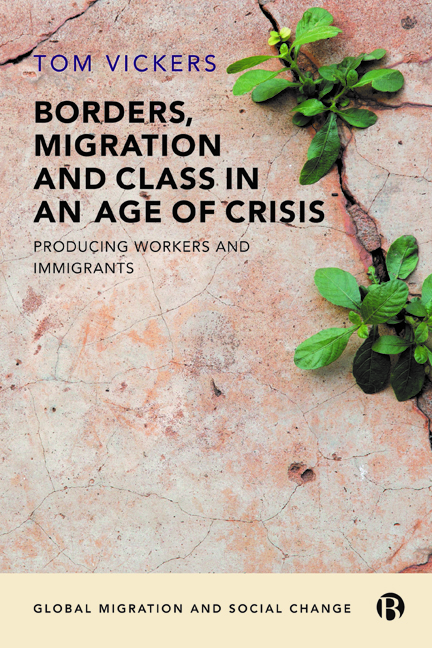Book contents
- Frontmatter
- Dedication
- Global Migration and Social Change
- Contents
- List of Figures and Tables
- Acknowledgements
- Series Preface
- 1 Introduction
- 2 Imperialism, Migration and Class in the 21st Century
- 3 Deconstructing Migrant Crises in Europe
- 4 Deconstructing Welfare Crises
- 5 Mobility Power and Labour Power in the Crisis of Imperialism
- 6 Deconstructing Migrant/Worker Categories in Britain
- 7 Conclusion
- Appendix: Methodology
- References
- Index
2 - Imperialism, Migration and Class in the 21st Century
Published online by Cambridge University Press: 30 April 2022
- Frontmatter
- Dedication
- Global Migration and Social Change
- Contents
- List of Figures and Tables
- Acknowledgements
- Series Preface
- 1 Introduction
- 2 Imperialism, Migration and Class in the 21st Century
- 3 Deconstructing Migrant Crises in Europe
- 4 Deconstructing Welfare Crises
- 5 Mobility Power and Labour Power in the Crisis of Imperialism
- 6 Deconstructing Migrant/Worker Categories in Britain
- 7 Conclusion
- Appendix: Methodology
- References
- Index
Summary
Introduction: capitalism is crisis
This chapter situates Britain within contemporary capitalism, laying the foundation for the analysis of migration crisis, welfare crisis and precarity that follows. The chapter begins by arguing that the economic crisis that has been widely recognised since 2007/08 arose from fundamental contradictions within capitalism and has had far-reaching consequences for society. This is followed by three main sections: the first uses ‘imperialism’ to describe capitalism's contemporary form as a distinctive organisation of the global space of capital and labour; the second considers migration, focusing on the role of borders and racism in structuring human mobility within imperialism; and the third discusses class, shaped by borders and racism within imperialist Britain.
Today, it is difficult to deny that capitalism is in crisis. We have moved a long way since the triumphalist declarations of the ‘end of history’ that followed the destruction of the Soviet Union (Fukuyama, 1992), and the 1997 Labour government's promises that it had escaped the ‘boom and bust’ cycle. These claims rang hollow in 2007 when the subprime mortgage crisis in the US set off a global chain reaction leading to the most severe economic crisis in a century (FRFI, 2011). Imperialist states responded by injecting massive amounts of public money into the banking system, followed by sweeping cuts to state welfare. Since then, the economic recovery has been ‘sluggish’ at best, and even many pro-capitalist economists predict further crises in the near future. An analysis of what Marx (1991 [1894]) calls the ‘laws of motion’ of capital accumulation shows that far from being exceptional, or the result of poor regulation, bankers’ greed or other moral or policy failings, crisis is intrinsic to capitalism.
Marx (1991 [1894]) argues that capitalism is necessarily expansive because without the promise of a larger return on the amount invested, there is no reason for capitalists to invest. As Grossman (1992 [1929]) demonstrates, a growing mass of accumulated capital requires constantly increasing investment opportunities, which will then return an even greater mass of capital requiring opportunities for investment, and so on. Sooner or later, the mass of accumulated capital cannot find sufficient profitable outlets and the system goes into crisis. Other tendencies may postpone the crisis, but not indefinitely (see also Yaffe and Bullock, 1979).
- Type
- Chapter
- Information
- Borders, Migration and Class in an Age of CrisisProducing Workers and Immigrants, pp. 17 - 54Publisher: Bristol University PressPrint publication year: 2019



